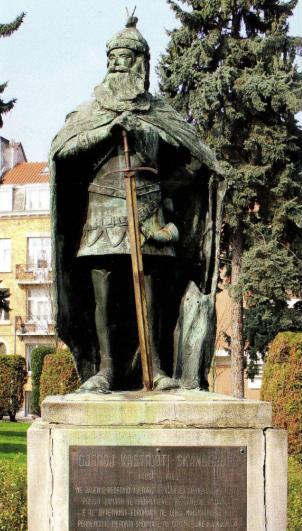Skënderbeg is the Albanian national hero and it is obvious that he has become a symbol of freedom, braveness and protection of Christianity. This historical figure has a significant place in the Albanian and global history, even in art, literature, visual arts, music and cinematography. While writers use historical documents and their fantasy, visual arts have just a few sources to exploit. The earliest portrait of Skenderbeg is supposed to have been made after a sketch of the Venetian painter Xhentile Benini, where Skenderbeg is presented an old man, maybe he has posed during his last trip in Italy in 1466, whereas the first sculpture of Skenderbeg is that of the sculptor and poet Murat Toptani (1917), and afterwards busts of the hero were placed all over Albania and in the world. The monument of Skenderbeg in Tirana was realized by Odhise Paskali, Andrea Mano and Janaq Paco (1968). The monument of Skenderbeg in Kruja (1959). The monument of Skenderbeg in Pristine, sculptor Janaq Paço work of art. The monument in Diber, work of art of sculptors Muharrem Turkeshi and Agim Sela (2009). The busts of Gorge Kastrioti are placed even in Tuzi, Presheva and Burrel towns. We also can find monuments even in Skopje, Macedonia, Thoma Thomai work of art (2006). The Skenderbeg bust in Kukes (1939). The monument in Albania square in Roma, Romano Romaneli work of art, Italian sculptor (1940). The monument in Brussels, Belgium (1968). Skenderbeg bust also placed in Vaccarizzo Albanese, village in Cosenza, Calabria, also in Civita, Italy (2008). The statue in San Cosmo Albanese (2010). The busts of the hero in the town of Fermo, Ancon (2007), that in San Cosmo Albanese (2010). The busts of the National Hero in Viena, Budapest, Switzerland, along Geneva lake, in Detroit, etc. The image of Skenderbeg is also placed in the Albanian biometric passports, which is now inseparable, while attempts continue to bring Skenderbeg in other towns around the world.

